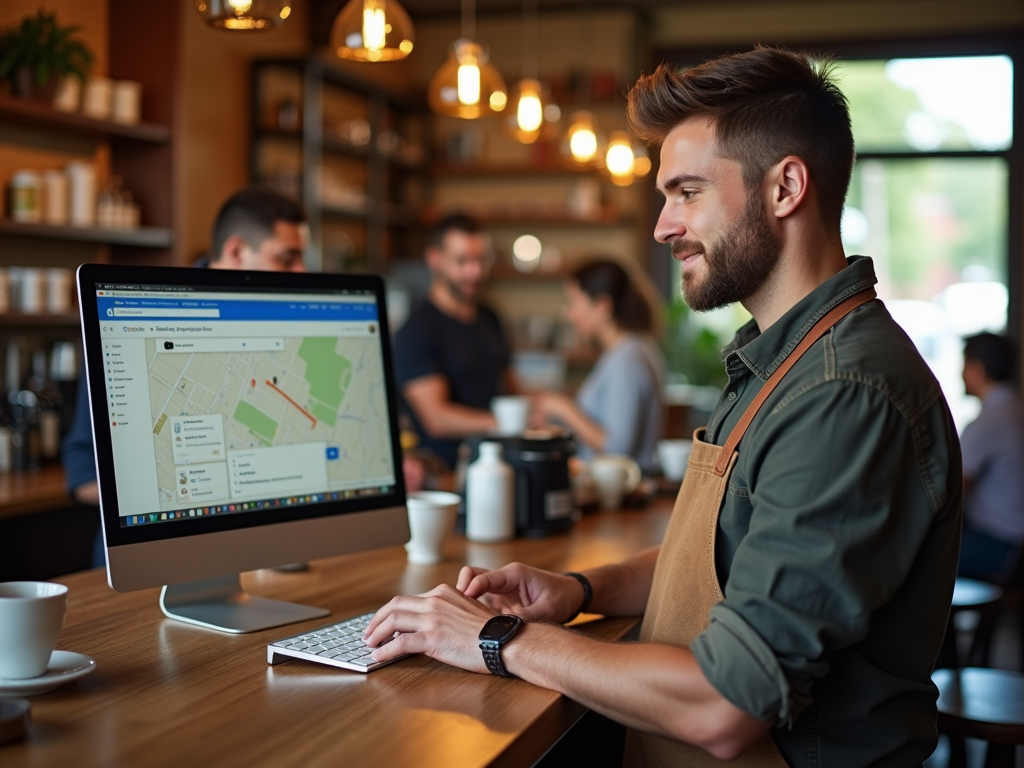Implementing SEO effectively is fundamental for local businesses looking to improve their online presence and attract customers in their geographic area. In this article, we will explore actionable strategies for using SEO in local business marketing, focusing on how to optimize your website and online profiles to connect with the local community. We will cover essential tactics like keyword optimization, utilizing Google My Business, generating local backlinks, and leveraging customer reviews to enhance visibility and drive traffic.
Understanding Local SEO

Local SEO refers to the process of optimizing your online presence to attract more business from relevant local searches. This approach is crucial for businesses that operate on a local level, as it helps improve visibility in local search results. Unlike traditional SEO, which targets broad audience searches, local SEO focuses on the keywords that customers might use when searching for products or services near them. For example, a bakery in Chicago might target keywords like “best cupcakes in Chicago” or “Chicago bakery near me.” Local SEO also incorporates location-based signals such as business listings, NAP (Name, Address, Phone Number) consistency, and local content.
Optimizing Your Website for Local Search

To ensure that your website is optimized for local searches, follow these essential steps:
- Keyword Research: Identify local keywords that your target audience is likely to use. Tools like Google Keyword Planner can help.
- Meta Tags: Include local keywords in your title tags, meta descriptions, and header tags to improve relevance.
- Content Creation: Develop content that speaks to local events, news, or activities related to your business or industry, thus appealing to local customers.
- Mobile Optimization: Ensure your website is mobile-friendly, as many local searches are performed on mobile devices.
- Load Speed: Optimize your site’s load speed to enhance user experience, as slow websites can drive potential customers away.
By employing these strategies, local businesses can significantly improve their visibility in search engines and attract more visitors to their sites.
Google My Business (GMB) is a free tool that is essential for local SEO. It helps businesses manage their online presence across Google, including Search and Maps. Here’s how to effectively claim and optimize your GMB listing:
- Claim Your Listing: Visit the Google My Business website and claim your business listing to get started.
- Complete Your Profile: Fill out all necessary fields, including business hours, categories, services, and a compelling business description.
- Add Photos: Upload high-quality images of your business, products, and services to attract attention.
- Gather Reviews: Encourage satisfied customers to leave positive reviews, which can enhance your credibility and ranking.
- Update Regularly: Keep your information current with updates regarding promotions or new services.
By optimizing your GMB listing, you can increase your chances of appearing in local search results and gain valuable insights into how customers interact with your business online.
Building Local Backlinks
Backlinks from local websites can have a positive impact on your local SEO efforts. These links signal to search engines that your business is relevant in the local context. Here are effective ways to build local backlinks:
- Engage with Local Blogs: Reach out to local bloggers in your industry and offer to write guest posts or collaborate on content.
- Sponsor Local Events: Sponsoring local events can often lead to backlinks from their websites in return for your support.
- Join Local Associations: Become a member of local business associations or chambers of commerce for potential links from their directories.
- Participate in Community Initiatives: Getting involved with local charities or initiatives can also yield valuable backlinks.
- Leverage Social Media: Share your content on local social media groups to further drive traffic and encourage shares.
By building local backlinks, you’re not only boosting your SEO but also establishing your brand’s authority within the local community.
Encouraging Customer Reviews and Testimonials
Customer reviews play a significant role in local business SEO. They not only influence search rankings but also impact potential customers’ decisions. To encourage more reviews:
- Ask for Feedback: After providing a service or selling a product, reach out to customers via email or in person and ask them to leave a review.
- Make It Easy: Provide direct links to your Google My Business page or other review sites to simplify the process.
- Respond to Reviews: Engage with customers by responding to both positive and negative reviews, showing that you value their feedback.
- Incentivize Reviews: Consider incentives such as discounts or entry into a giveaway for customers who leave reviews.
- Showcase Testimonials: Highlight positive reviews on your website and social media to attract more attention.
Utilizing customer reviews not only strengthens your local SEO but also builds trust with potential customers.
Conclusion
Implementing effective local SEO strategies is essential for small businesses aiming to increase their visibility and attract more customers in their area. By optimizing your website, claiming your Google My Business listing, building local backlinks, and encouraging customer reviews, you’re setting a strong foundation for your local marketing efforts. With time and commitment, these strategies can lead to significant improvements in your search rankings and ultimately drive more foot traffic and sales. Invest in local SEO today to connect with your community and thrive in the competitive market.
Frequently Asked Questions
1. What is local SEO and why is it important?
Local SEO focuses on optimizing a business’s online presence to attract customers from specific geographical locations, making it vital for businesses targeting local markets. It enhances visibility, drives foot traffic, and encourages customer engagement.
2. How do I optimize my Google My Business listing?
To optimize your GMB listing, claim your business, complete your profile with accurate information, upload quality images, gather reviews, and keep your information current and updated.
3. What are local keywords and how do I find them?
Local keywords are phrases that include location-specific terms along with your goods or services. You can find them using tools like Google Keyword Planner or by analyzing competitor keywords targeting similar geographies.
4. Why are customer reviews important for local SEO?
Customer reviews are crucial as they increase your credibility, enhance local search rankings, and influence the buying decisions of potential customers.
5. How long does it take to see results from local SEO strategies?
Results from local SEO strategies can vary widely, but typically, businesses may start noticing improvements in search rankings and customer engagement within three to six months of consistent efforts.



